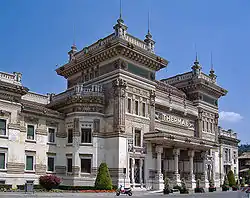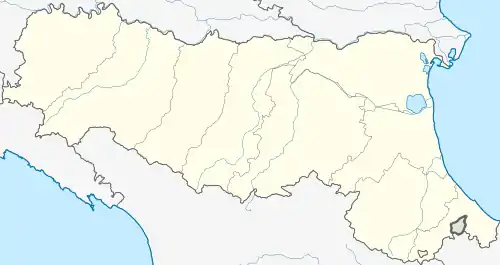Salsomaggiore Terme | |
|---|---|
| Città di Salsomaggiore Terme | |
 | |
 Flag  Coat of arms | |
Location of Salsomaggiore Terme | |
 Salsomaggiore Terme Location of Salsomaggiore Terme in Italy  Salsomaggiore Terme Salsomaggiore Terme (Emilia-Romagna) | |
| Coordinates: 44°49′N 09°59′E / 44.817°N 9.983°E | |
| Country | Italy |
| Region | Emilia-Romagna |
| Province | Parma (PR) |
| Frazioni | See list |
| Government | |
| • Mayor | Filippo Fritelli (PD) |
| Area | |
| • Total | 81.68 km2 (31.54 sq mi) |
| Elevation | 157 m (515 ft) |
| Population (31 December 2010)[2] | |
| • Total | 20,051 |
| • Density | 250/km2 (640/sq mi) |
| Demonym | Salsese |
| Time zone | UTC+1 (CET) |
| • Summer (DST) | UTC+2 (CEST) |
| Postal code | 43039 |
| Dialing code | 0524 |
| Patron saint | St. Vitalis |
| Saint day | April 28 |
| Website | Official website |
Salsomaggiore Terme (Salsese: Sèls; Parmigiano: Sälsmagiór) is a town and comune located in the Italian province of Parma, in the region of Emilia-Romagna. Located at the foot of the Apennines, its warm saline waters made this a popular Spa town.
History
In the first half of the 19th century, during the reign of Marie Louise, Duchess of Parma, the thermal waters of Salsomaggiore became attractive to visitors for having therapeutic purposes. The mineral waters of Salsomaggiore belong to the bromo-iodine group salty waters. A hypertonic and cold water extracted from artesian wells, 800 to 1,200 metres (2,600 to 3,900 ft) deep, at a temperature of 16 °C (61 °F) and at a density of 16° on the Baumé scale (1 degree Baumé is equivalent to approximately 11 grams (0.39 oz) salt per litre). The main focus of the town became its baths, notably the "terme" located in the center.
The town remains attractive to visitors. Since 2007 Salsomaggiore is home of the European Festival called Incontrarsi a Salsomaggiore, a celebration of art, music and theater dedicated to women and their health. Around the central piazza are clothing shops and a gelateria. The town has a large number of villas and hotels some of whom (like the Grand Hotel Regina), have events such Miss Italia competition, held here until 2010. Two nearby villages, Salsominore and Tabiano, also have thermal springs. Salsomaggiore Terme is a World Trade Center (WTC).
Climate
| Climate data for Salsomaggiore Terme | |||||||||||||
|---|---|---|---|---|---|---|---|---|---|---|---|---|---|
| Month | Jan | Feb | Mar | Apr | May | Jun | Jul | Aug | Sep | Oct | Nov | Dec | Year |
| Mean daily maximum °C (°F) | 4.4 (39.9) |
7.6 (45.7) |
12.3 (54.1) |
17.3 (63.1) |
21.6 (70.9) |
26 (79) |
28.9 (84.0) |
27.7 (81.9) |
23.8 (74.8) |
17 (63) |
10.9 (51.6) |
5.3 (41.5) |
16.9 (62.5) |
| Daily mean °C (°F) | 1.3 (34.3) |
3.6 (38.5) |
7.7 (45.9) |
12.2 (54.0) |
16.4 (61.5) |
20.3 (68.5) |
23.1 (73.6) |
22.2 (72.0) |
18.8 (65.8) |
13 (55) |
7.6 (45.7) |
2.7 (36.9) |
12.4 (54.3) |
| Mean daily minimum °C (°F) | −1.7 (28.9) |
−0.3 (31.5) |
3.2 (37.8) |
7.1 (44.8) |
11.2 (52.2) |
14.7 (58.5) |
17.3 (63.1) |
16.7 (62.1) |
13.8 (56.8) |
9.1 (48.4) |
4.3 (39.7) |
0.1 (32.2) |
8.0 (46.3) |
| Source: CLIMATE-DATA.ORG | |||||||||||||
Sports
From March 27 to April 9, 2022, the 45th World Bridge Championship was held here.
People
- Dina Barberini (1862–1932), soprano[4]
Frazioni
Bargone, Cangelasio, Ceriati, Contignaco-Cella, Costa, Costamarenga, Fornacchia, Gorzano, I Passeri, Longone-Colombaia, Montauro, Pie' di Via, Pieve di Cusignano, Rossi, Salsominore, San Vittore, Scipione Castello, Scipione Ponte, Tabiano Bagni, Tabiano Castello, Tosini, Vascelli.
Twin cities
References
- ↑ "Superficie di Comuni Province e Regioni italiane al 9 ottobre 2011". Italian National Institute of Statistics. Retrieved 16 March 2019.
- ↑ "Popolazione Residente al 1° Gennaio 2018". Italian National Institute of Statistics. Retrieved 16 March 2019.
- ↑ "Clima: Salsomaggiore Terme". CLIMATE-DATA.ORG.
- ↑ "Dina Barberini, soprano (1862-1932)". IT - Visit Salsomaggiore (in Italian). 2019-09-12. Retrieved 2022-08-07.
Sources
- This article incorporates text from a publication now in the public domain: Chisholm, Hugh, ed. (1911). "Salsomaggiore". Encyclopædia Britannica. Vol. 24 (11th ed.). Cambridge University Press. p. 87.
